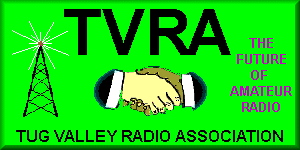HOME
FIELD DAY
SILENT KEYS
LINK TO TVRA
CALLSIGN SEARCH
LOCAL REPEATERS
TVRA SUPPORTERS
How to become a HAM
Q Signals & Phonenics
|
How to become a Ham
What is Ham Radio?
|
Amateur Radio (nicknamed "ham radio") is the greatest hobby in the world! Ham radio operators use a variety of different radio frequencies to make friends with people all over the world, communicate over orbiting space satellites, and provide emergency communications during disasters.
In the United States, Amateur Radio is administered by the Federal Communications Commission. The FCC requires hams show competency and knowledge of electronics, radio frequency safety, operating procedures, and basic rules and regulations ( Part 97) by passing different written and Morse Code proficiency exams.
This website is intended as a resource for those studying to pass a amateur radio exam within the United States. The complete question pools are available on the ARRL web site in both PDF and Text format, and you can even take a sample written Clicktron/QRZ Practice Amateur Radio Exams and/or a morse code test to gauge your progress! Also study manuals may be obtain at your local Radio Shack.
|
|
A good source of information on how to get started and eventually receive your Amateur Radio License is to monitor the 147.090 repeater located in Phelps, Ky. or search between 144.000 thru 148.000 on your police scanner, these will be local Hams in your area. Also if you own a shortwave receiver you may tune in and listen to Hams around the world. A frequency chart may be found here. We have a special net called the Nightly Talk Around Net that starts at 9:00 P.M. each night. The schedule can be found at NTAN. Other Nets may be found at Local Nets.
Many people that come into the hobby find help from someone which we call a Elmer. A Elmer is a Ham who offers their time teaching you how to become a good Ham.
Regardless of your age or technical expertise, there is something that Amateur Radio can offer to everyone. Here are some of the activities or benefits that can be realized as a licensed amateur operator:
|
- World wide communications (DX)
- Transmit data from computer to computer (Packet Radio)
- Provide public emergency communications (ARES)
- Communicate via satellite
- Bounce signals off the moon
- Operate at very low power levels (QRP)
- Develop technical expertise by experimentation
- Send your own television pictures. (ATV)
- Meet new friends around the World.
We hope that you have enjoyed your visit to the Tug Valley Radio Association Home Page. We welcome your comments and suggestions about changes and improvements that you would like to see on this web page..
Copyright � 2000 by TVRA. All Rights Reserved.
Page Designed By: Eddie Tussey/AI4UK
|
|



